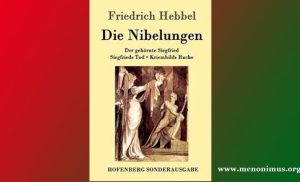Die Nibelungen A Theatrical Gem Reimagined Friedrich Hebbel A Review
 Die Nibelungen A Theatrical Gem Reimagined Friedrich Hebbel A Review
Die Nibelungen A Theatrical Gem Reimagined Friedrich Hebbel A Review
Die Nibelungen (A Theatrical Gem Reimagined ) by Friedrich Hebbel- A Review
Introduction:
Friedrich Hebbel’s ‘Die Nibelungen’ stands as a testament to the enduring appeal of the Nibelungenlied saga, offering a later adaptation that captivates audiences through its intriguing reimagining of the epic tale. With its intricate characters, dramatic tension, and thematic depth, Hebbel’s work presents a rich canvas that both honors the source material and adds unique layers of interpretation.
Plot and Narrative:
‘Die Nibelungen’ takes the essential narrative of the Nibelungenlied and reshapes it, presenting a more focused exploration of the complex relationships and motivations that drive the characters. Hebbel deftly balances the original saga’s grandeur with a tighter, more intimate storytelling approach. This adaptation maintains the core plot points of betrayal, vengeance, and tragic downfall while introducing subtle shifts that highlight the psychological aspects of the characters’ choices. The narrative unfolds organically, engaging the audience through a well-paced structure that builds suspense and emotional resonance.
Characterization:
One of the highlights of Hebbel’s adaptation is his nuanced portrayal of characters. Siegfried, Kriemhild, Hagen, and Gunther are all given more intricate motivations and inner conflicts, allowing the audience to delve deeper into their psyches. The emotional complexities that drive their actions are explored with depth, making the characters more relatable and multidimensional. Kriemhild’s transformation from a joyful bride to a vengeful figure driven by grief is particularly well-executed, demonstrating Hebbel’s skill in character development.
Themes and Symbolism:
Hebbel’s ‘Die Nibelungen’ delves into timeless themes that resonate with audiences across cultures and eras. The exploration of loyalty, honor, betrayal, and the corrosive effects of vengeance are central to the adaptation. Additionally, the play introduces elements of fate and destiny, with characters grappling with their predetermined roles and the consequences of their choices. These themes are often underscored by symbolic imagery, such as the recurring motif of the Nibelung treasure as a corrupting force that reflects the characters’ desires and moral decay.
Language and Dialogue:
Hebbel’s language is eloquent and evocative, capturing both the grandeur of the original epic and the psychological depth he seeks to explore. The dialogue is rich with subtext, allowing characters to convey their inner conflicts and desires through layered conversations. Hebbel’s ability to infuse the text with emotion enhances the theatrical experience, immersing the audience in the characters’ dilemmas and passions.
Staging and Visual Design:
The adaptation’s success is not solely reliant on its text; the visual elements play a crucial role in conveying the story’s essence. The play’s settings, costumes, and staging choices contribute to the overall atmosphere. Hebbel’s descriptions offer room for interpretation, inviting directors to envision their own unique visual representations of the story. From the grand halls of the Burgundian court to the haunting allure of the Nibelung treasure, the adaptation’s visual design can greatly enhance its impact on the audience.
Conclusion:
Friedrich Hebbel’s ‘Die Nibelungen’ stands as a compelling reinterpretation of the Nibelungenlied, breathing new life into the saga while staying true to its core elements. With its thought-provoking exploration of character psychology, timeless themes, and poetic language, the adaptation captures the essence of the original epic while offering fresh insights. By melding tradition with innovation, Hebbel crafts a theatrical gem that continues to resonate with audiences, inviting them to reflect on the complex interplay of human emotions and destinies. 0 0 0.
Die Nibelungen A Theatrical Gem Reimagined Friedrich Hebbel A Review
You May Like: Beowulf-A Review
N.B. The article originally belongs to the book entitled ‘The Reviews of Epic Literature Around the World Vol-II‘ by Menonim Menonimus.







